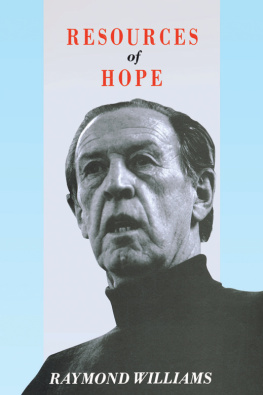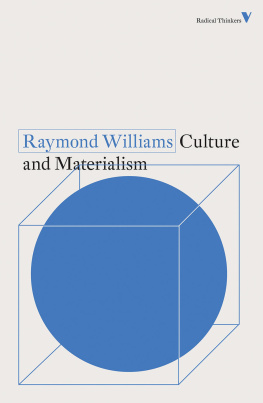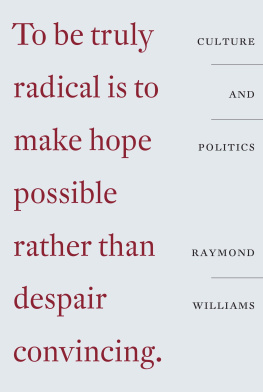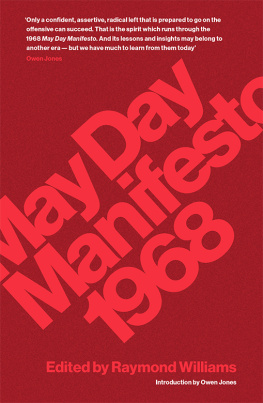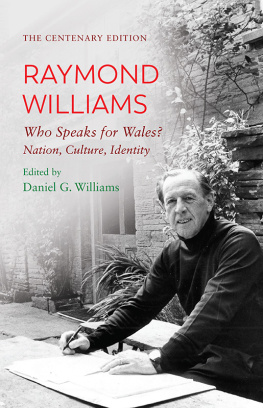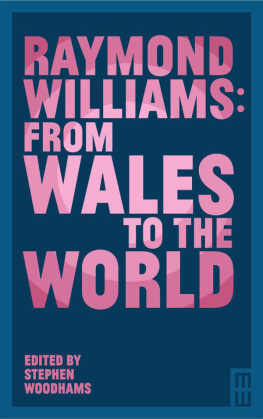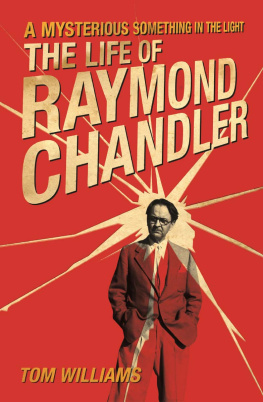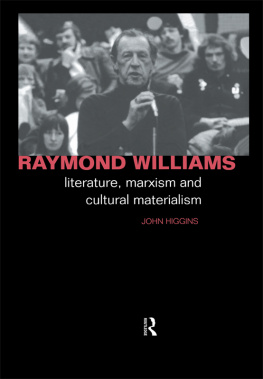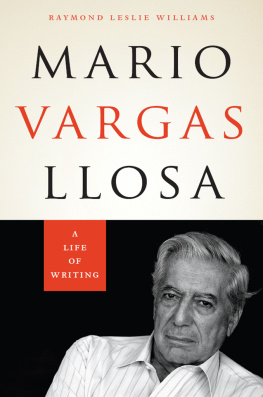Raymond Williams - The Long Revolution
Here you can read online Raymond Williams - The Long Revolution full text of the book (entire story) in english for free. Download pdf and epub, get meaning, cover and reviews about this ebook. year: 1965, publisher: Penguin Books Ltd, genre: Politics. Description of the work, (preface) as well as reviews are available. Best literature library LitArk.com created for fans of good reading and offers a wide selection of genres:
Romance novel
Science fiction
Adventure
Detective
Science
History
Home and family
Prose
Art
Politics
Computer
Non-fiction
Religion
Business
Children
Humor
Choose a favorite category and find really read worthwhile books. Enjoy immersion in the world of imagination, feel the emotions of the characters or learn something new for yourself, make an fascinating discovery.

- Book:The Long Revolution
- Author:
- Publisher:Penguin Books Ltd
- Genre:
- Year:1965
- Rating:5 / 5
- Favourites:Add to favourites
- Your mark:
- 100
- 1
- 2
- 3
- 4
- 5
The Long Revolution: summary, description and annotation
We offer to read an annotation, description, summary or preface (depends on what the author of the book "The Long Revolution" wrote himself). If you haven't found the necessary information about the book — write in the comments, we will try to find it.
The Long Revolution — read online for free the complete book (whole text) full work
Below is the text of the book, divided by pages. System saving the place of the last page read, allows you to conveniently read the book "The Long Revolution" online for free, without having to search again every time where you left off. Put a bookmark, and you can go to the page where you finished reading at any time.
Font size:
Interval:
Bookmark:
T HE LONG REVOLUTION
RAYMOND WILLIAMS

Foreword to The Long Revolution , 2011
Anthony Barnett
After half a century, why should we still read The Long Revolution ?
The immediate answer is because, from Cairo to Madrid, we live in revolutionary times. However, this customary use of the word revolution is different from that in Raymond Williams title of this peculiar and important book. Highlighting the contrast between the meaning of his term and the familiar one may be the best way for new readers to start to grasp the extraordinary relevance of what you are holding in your hand or sampling on a tablet. For it isnt really a book in the sense of a self-contained work that has a beginning, middle and end. Rather The Long Revolution is the cross-section of an argument that starts elsewhere, in particular in the last chapters of Williams Culture and Society published in 1958, continues in other books and, naturally, has yet to conclude.
The books title is a concept not a description. When he refers to the Long Revolution Williams is theorising a different epochal process, not saying, Hey, this revolution is taking a long time as if the revolution referred to is self-evident and he is telling us about its duration. So his term Long Revolution (from now on I will use it with capital letters when I mean Williams concept) is not an oxymoron or used with any sense of irony, let alone placing him on the side of those gradualists who claim to know better than believe in nave hopes of fast, real change. On the contrary, Williams was utterly confident of the possibility of, and need for, decisive change and the creative capacity of working people to take charge of it if they have the chance. His term is a claim: that there is a historical process that is hard to comprehend because we are all within it, and it is that which he is attempting to articulate for the first time.
When on a clear night we look at the long cluster of stars that we call the Milky Way it is not obvious that what we are looking at is our own spiral galaxy from our position towards its edge. But the process of elementary astronomical knowledge and mental reorientation that such a recognition demands is simple compared to the understanding Williams is calling for. He argues that we are within a far-reaching transformation one that brought forth the very terms such as democracy, industry, culture, art and class that we use to describe and measure it. Its transformation will take has already taken centuries. It is necessarily lengthy and multi-generational: Everything that I understand of the history of the Long Revolution leads me to the belief that we are still in its early stages.
The concept of the Long Revolution brings together three of Williams themes which are also defining aspects it. Being prepared for these will make it easier to read Williams.
First, because we are within it and it is within us, shaping us in terms of our experience, our relationships with others, our differences from other generations, our work, even (as we have just noted) producing the very ideas we use to describe it, it is extraordinarily hard for us to comprehend the Long Revolution. This recognition of the difficulty of what needs to be attempted is central to Williams argument and his method of self-awareness. We have to build into any understanding of our society that we are undertaking this work within an inherited framework of what it means to understand it, a framework that we must also question. The recognition of such difficulty anchors his opposition to all easy answers that belittle us, whether in politics (especially on the left), in the market place or culture at large. His stress on the inner challenge of understanding links to what he regarded as the essential and also very demanding external effort of collaboration. It becomes almost a trope across his writings. He might well have named this book The Difficult Revolution.
Second, the recognition of difficulty is related to the fact that the Long Revolution is a complex whole. For Williams the most important part of the Long Revolution it is not a part at all: it is the interrelationships of all of its constituent parts to one another. Each needs to be understood for what they are, but it is the interaction, interpenetration and feedback of industry, democracy and culture that makes the transformation they entail. None does it on its own, whatever particular priority it may have. This emphasis on relationships and interrelationship is a great virtue of Williams work (even if it does not make it easy to read, it gives it a reassuring integrity that he is not seeking a short-cut or a decorative flourish). There is a constant, gritty stress and working through of both the separate processes and their simultaneous shaping influence upon each other, which taken as a whole releases the energy of change: What we are looking for, always, is the actual life that the whole organisation is there to express. The Long Revolution might also have been titled The Whole Revolution.
Third, as you can see from this characteristic claim, Williams understands the energy of the Long Revolution in terms of the way it is lived. This allows him to move seamlessly (as radicals of both left and right so often do) from sociology to agency: from analysis of what is happening to advocacy of what needs to be done. But in a way that is very interesting. In a section called Tragedy and Revolution of a book on drama, Modern Tragedy , published five years after The Long Revolution , Williams turns to what it means to be a revolutionary. He dismisses out of hand Communists who dehumanise the victims of revolution as merely the class enemy. But continues, I do not believe, as so many disillusioned or broken by actual revolution have come to believe, that the suffering can be laid to the charge of the revolution alone, and that we must avoid revolution if we are to avoid suffering. On the contrary, I see revolution as the inevitable working through of a deep and tragic disorder, to which we can respond in varying ways We need not identify revolution with violence or with a sudden capture of state power. Even where such events occur, the essential transformation is indeed a long revolution.
Here he bends his term back towards the familiar one of a political uprising, what he later refers to as the short revolution. The Long Revolution could have been titled, The Human Revolution.
While this argument is clearly a humanism it is not a liberal or individualist humanism. It echoes the republican argument, set out for example in Quentin Skinners Liberty before Liberalism , that the liberty of others is essential to our own and that the presence of state despotism for any enslaves us all. Williams understood that his humanism pitted him against the dominant socialisms of his time, Fabianism and Stalinism, It has been the gravest error of socialism, in revolt against class societies, to limit itself, to the terms of its opponents: to propose a political and economic order rather than a human order.
These three constitutive features of our Long Revolution as conceptualised by Williams its difficulty, its complex unity, its humanity together form a theory of revolution that is not mechanical, determinist or reductionist. To develop this attractive insight would take me further than a foreword, but there are two revealing clues that can be quoted from related books by Williams and they reflect well on the spirit of the man. In 1958, in Culture and Society he writes in the chapter on Marxism and Culture, For, even if the economic element is determining, it determines a whole way of life, and it is to this, rather than to the economic system alone, that the literature has to be related. And not just literature.
Next pageFont size:
Interval:
Bookmark:
Similar books «The Long Revolution»
Look at similar books to The Long Revolution. We have selected literature similar in name and meaning in the hope of providing readers with more options to find new, interesting, not yet read works.
Discussion, reviews of the book The Long Revolution and just readers' own opinions. Leave your comments, write what you think about the work, its meaning or the main characters. Specify what exactly you liked and what you didn't like, and why you think so.

